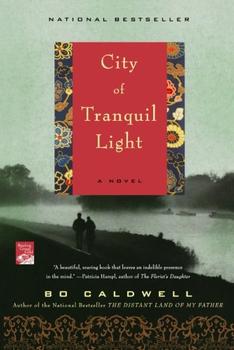Summary | Excerpt | Reading Guide | Reviews | Beyond the Book | Readalikes | Genres & Themes | Author Bio

A Novel
by Bo Caldwell
Edward's excitement is a dramatic contrast to the somber mood of the others. His eyes are bright as he talks of leaving in the morning, and I see the energy in his step and his movements, as though this tidy home in which we are guests constrains him. Of course he really is returning home - to Naomi and the boys and the new baby, all of whom I'm eager to see - so there is reason for his joy. But I think it is more than a homecoming. He is excited about the work.
As am I. I have no idea what this life will be like, nor can I guess whether I'll be gone for five years or fifty. I know only that I am happy - in my heart and mind and soul and even my body, which feels strong and sturdy and healthy. I'm weary too, but I don't mind the fatigue; I am on my way to China, and that is enough.
Early the next morning we left for the Seattle docks and for the S.S. Minnesota, which was to depart shortly before noon. Edward settled us on board then went to secondhand stores to purchase a few last supplies he knew he couldn't get in China. Noon came and he hadn't returned, a problem because he had the tickets. The whistle blew once, then a second time, and finally Edward came charging up the gangplank, awkwardly carrying a load of folding chairs he'd bought at what he excitedly said was a most reasonable price.
The thick ropes tethering the ship to the dock were untied and we were under way. I stayed on deck, and in my mind I said goodbye to my family once again as I watched Seattle and America recede.
Edward joined me, and for a while we were silent. Then he said, "Perhaps it's time to learn your first Mandarin phrase."
I was immediately anxious; I did not feel at all up to tackling a new language. But when he spoke again, I was so drawn to the sound of what he said that I couldn't help asking its meaning.
He smiled and repeated it. "Tsaichien mei-kuo," he said. "Tsaichien is goodbye, mei is beautiful, kuo is country. That's the name for America: Beautiful Country."
I tried to repeat it. Then I asked him the word for China.
"Chung-Kuo," he said. "It means Middle Kingdom, because of the people's ancient belief that their country was at the center of a vast square earth, surrounded by the Four Seas, beyond which lay islands inhabited by barbarians. That's us." Edward turned and faced the front of the ship, and the expanse of ocean spread before us, so that America was behind us. "The strange part," he said softly, "is that after you've been there for a while, it truly does feel like the center of the world. It becomes a place you never want to leave."
I nodded, willing to be convinced. For at that moment, despite the homesickness that had accompanied me like a stowaway since I'd left home, I had a dim hope that, given time, I might come to feel the same.
Excerpted from City of Tranquil Light by Bo Caldwell. Copyright © 2010 by Bo Caldwell. Excerpted by permission of Henry Holt and Company. All rights reserved. No part of this excerpt may be reproduced or reprinted without permission in writing from the publisher.
Music is the pleasure the human mind experiences from counting without being aware that it is counting
Click Here to find out who said this, as well as discovering other famous literary quotes!
Your guide toexceptional books
BookBrowse seeks out and recommends the best in contemporary fiction and nonfiction—books that not only engage and entertain but also deepen our understanding of ourselves and the world around us.